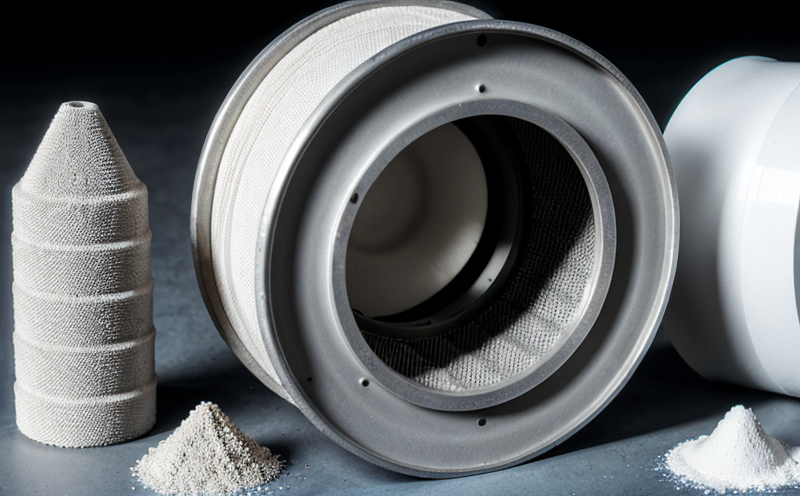RINA Rules Compliance Testing of Marine Systems
When designing and manufacturing marine systems, compliance with RINA rules is crucial. These rules ensure that ships are safe, reliable, and meet the highest standards in terms of performance and environmental impact. Our laboratory specializes in providing comprehensive testing services to help manufacturers and quality managers achieve this compliance.
The process starts with thorough planning. We collaborate closely with our clients to understand their specific needs and requirements for marine system components, such as additive manufacturing materials used in shipbuilding. This includes selecting the appropriate materials that not only meet RINA rules but also enhance performance and reliability under maritime conditions.
Once the plan is established, we proceed with specimen preparation. For additive manufacturing materials, this involves creating prototypes or test samples using state-of-the-art 3D printing technology. The specimens are then subjected to rigorous testing using advanced equipment that simulates real-world conditions found in marine environments. This ensures that any potential issues are identified early in the development stage.
The testing process includes a variety of mechanical tests, thermal cycling tests, and immersion tests aimed at evaluating key properties such as strength, durability, corrosion resistance, and fatigue behavior. Our laboratory uses internationally recognized standards like ISO 10356 for additive manufacturing materials to ensure consistency and reliability in our test results.
After completing the tests, we generate detailed reports that document all findings. These reports serve as valuable tools for quality managers, R&D engineers, and compliance officers by providing comprehensive insights into material performance under various stress conditions. They also help identify areas where improvements can be made to enhance product quality further.
In summary, our RINA rules compliance testing service offers a robust solution for ensuring that marine systems comply with stringent regulations set forth by the Registro Italiano Navale (RINA). By leveraging cutting-edge technology and adhering strictly to international standards, we provide accurate, reliable, and actionable data which aids in meeting regulatory requirements while promoting innovation within the industry.
Why It Matters
The importance of RINA rules compliance cannot be overstated for any company involved in marine equipment manufacturing. These regulations are designed to protect both human life and the environment by setting stringent standards that govern how ships operate, maintain safety features, and reduce emissions.
- Enhanced Safety: Adhering to RINA rules helps prevent accidents at sea through rigorous testing of critical components like propellers, shafts, and hull structures. This ensures that vessels remain seaworthy under all conditions.
- Environmental Protection: Compliance with environmental aspects of the rules reduces pollution by minimizing fuel consumption and emissions from ships. It also promotes sustainable practices in vessel design and operation.
- Regulatory Requirements: Failure to comply can result in hefty fines, operational disruptions, and reputational damage for non-compliant entities. Meeting these standards ensures smooth sailing through regulatory compliance processes.
- Innovation Encouragement: By setting high benchmarks, RINA rules encourage manufacturers to innovate and develop safer, more efficient products that contribute positively towards global maritime standards.
Overall, adhering to RINA rules is essential for maintaining a competitive edge in the marine industry while contributing to safer oceans and cleaner skies.
Benefits
The advantages of undergoing RINA rules compliance testing extend beyond mere regulatory satisfaction; they offer numerous benefits that positively impact various aspects of your business:
- Increased Customer Trust: Demonstrating adherence to international standards builds trust among customers who prioritize safety and quality in their purchasing decisions.
- Improved Product Quality: Our testing ensures that every component meets or exceeds the required specifications, leading to higher product reliability and longevity.
- Economic Savings: Early detection of flaws through comprehensive testing helps avoid costly rework or failures later on in production cycles.
- Competitive Edge: By meeting RINA rules first, you differentiate yourself from competitors who may struggle to meet these stringent requirements.
- Enhanced Reputation: Successfully complying with RINA rules enhances your company’s reputation as a leader in maritime technology and engineering excellence.
Investing in our services not only meets regulatory expectations but also strengthens your brand image, fosters long-term relationships with clients, and paves the way for future growth opportunities within the industry.
Environmental and Sustainability Contributions
- Cut Emissions: By ensuring that additive manufacturing materials used in marine systems are optimized for efficiency, we help reduce overall fuel consumption, thereby minimizing carbon dioxide emissions from ships.
- Promote Recycling: Our testing supports the development of recyclable materials which can be reused throughout the lifecycle of a ship, reducing waste and promoting circular economy principles.
- Reduce Noise Pollution: Through improved design and material selection, we contribute to quieter ships that produce less noise pollution in aquatic ecosystems.
- Enhance Fuel Efficiency: Testing ensures that new technologies like additive manufacturing materials lead to more fuel-efficient vessels, reducing operational costs and environmental impact simultaneously.
Our commitment to sustainability aligns with global efforts towards greener transportation solutions. By integrating our testing services into your product development process early on, you can make significant strides toward achieving these environmental goals while maintaining high levels of performance and reliability.





